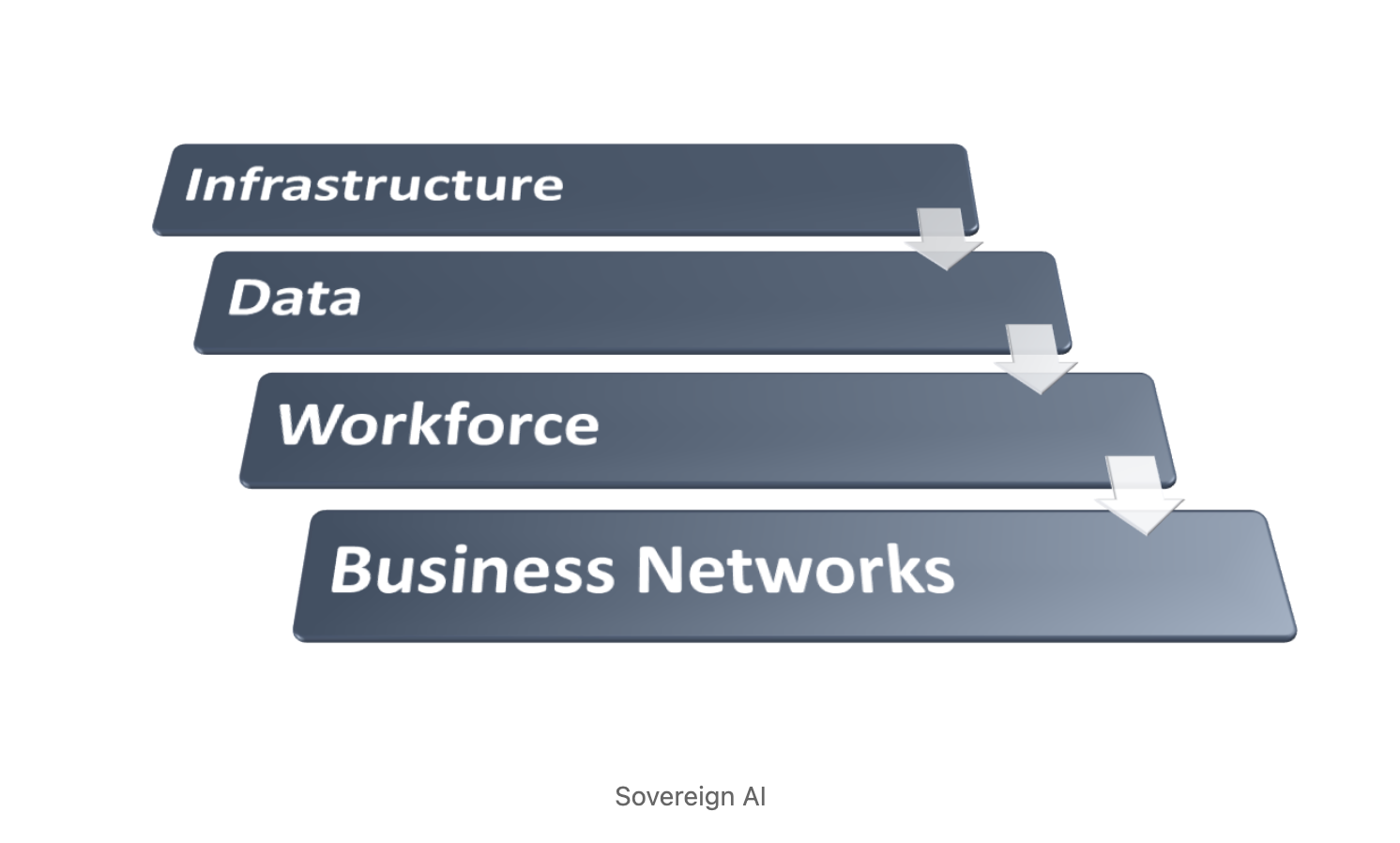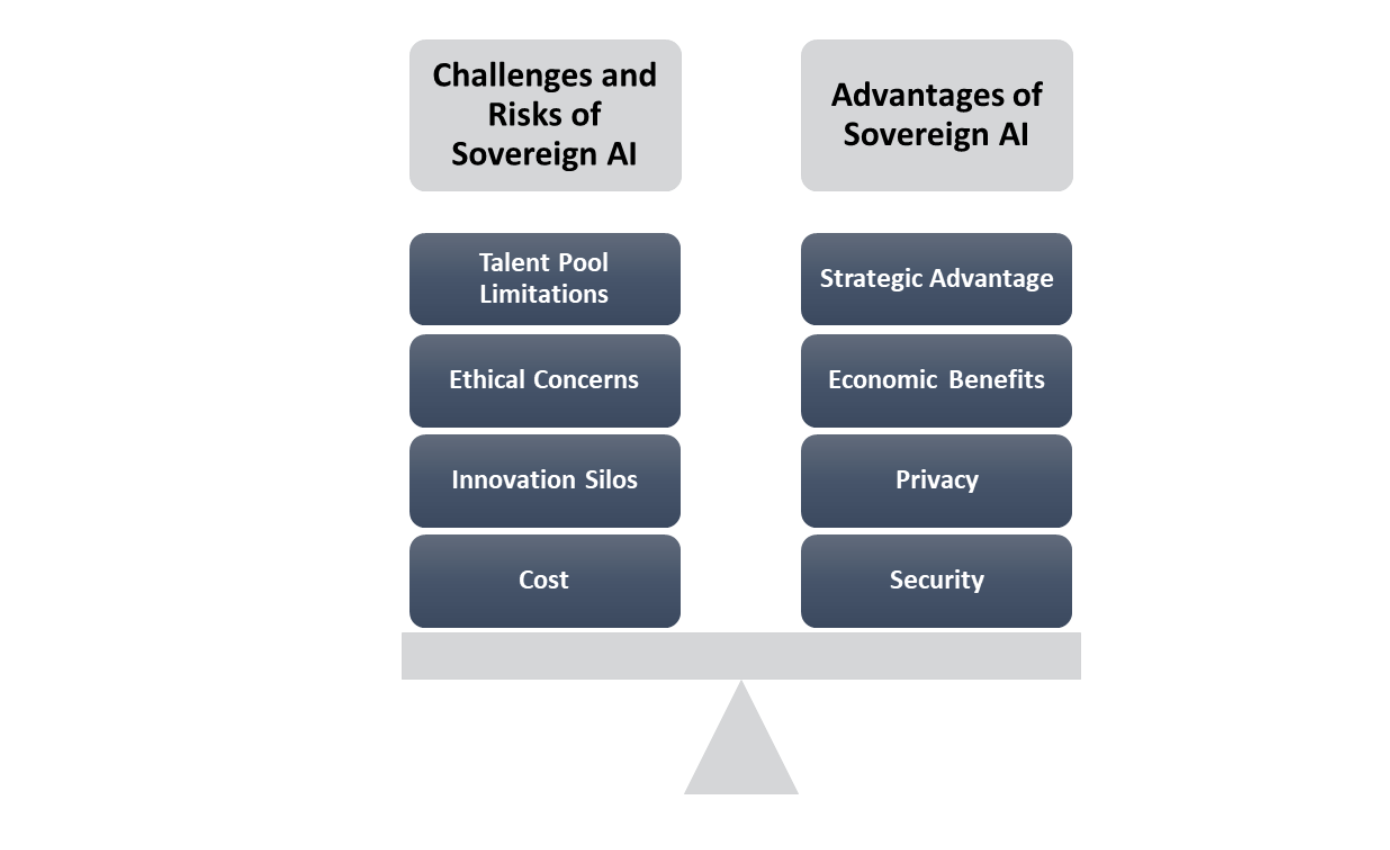Comments
- No comments found

Artificial intelligence (AI) is rapidly transforming our world from healthcare and transportation to national security and economic competitiveness.
In this evolving landscape, a new concept is gaining traction: Sovereign AI. We will delve into the intricacies of sovereign AI, exploring its potential benefits, drawbacks, and the technical landscape that underpins it.

Defining Sovereign AI
Sovereign AI embodies a nation's ability to independently develop, deploy, and govern AI technologies. This independence encompasses a range of domains:
Infrastructure: The physical foundation of AI, consisting of data centers, high-performance computing (HPC) clusters, and specialized hardware like GPUs (Graphics Processing Units) and TPUs (Tensor Processing Units). Sovereign AI aims for domestic ownership or control over this infrastructure.
Data: Fueling the learning process of AI models, data acts as the raw material from which insights and patterns are extracted. Sovereign AI emphasizes using data collected and stored within national borders to avoid reliance on external sources. This often involves robust data governance frameworks.
Workforce: The human element is vital for driving AI innovation. Sovereign AI necessitates a skilled domestic workforce encompassing AI engineers, data scientists, and researchers. Cultivating a robust talent pipeline is crucial.
Business Networks: A thriving domestic AI ecosystem fosters collaboration between research institutions, startups, and established corporations. Sovereign AI seeks to nurture such an ecosystem to generate a flow of ideas and applications.
The pursuit of sovereign AI is intricately linked to the broader notion of digital sovereignty. Digital sovereignty posits that control over digital technologies is essential for a nation's security, economic prosperity, and autonomy in the globalized world.

Advantages of Sovereign AI
Several compelling reasons are driving the national quest for sovereign AI:
Security: Controlling AI infrastructure and data mitigates vulnerabilities associated with foreign espionage or manipulation of algorithms. This is particularly critical for military and national security applications of AI.
Privacy: Sovereign AI can offer greater control over citizen data. By keeping data within national borders and adhering to domestic privacy regulations, countries can safeguard citizen privacy and build trust in AI systems.
Economic Benefits: A robust domestic AI industry fosters economic growth by creating high-skilled jobs, stimulating innovation, and attracting investments. This can lead to a competitive edge in the global AI market.
Strategic Advantage: As AI proficiency is projected to play a pivotal role in future technological and military competition, sovereign AI allows nations to develop their own advanced AI-powered capabilities, fostering self-reliance and strategic autonomy.
Challenges and Risks of Sovereign AI
While the pursuit of sovereign AI is attractive, significant challenges and potential risks need consideration:
Cost: Building and maintaining independent AI infrastructure, talent pool, and data resources can be financially draining. Smaller nations might struggle to compete with resource-rich countries.
Innovation Silos: Nationalistic AI development might hinder international collaborations that foster cross-pollination of ideas and expertise. This could lead to slower progress and duplication of efforts.
Ethical Concerns: The emphasis on domestic data collection raises concerns about potential biases within national datasets, leading to ethically questionable AI applications. Robust governance frameworks are critical to mitigate these risks.
Talent Pool Limitations: Focusing solely on domestic talent might limit access to the best global minds working on AI. Striking a balance between domestic talent development and attracting international expertise is crucial.
The Technical Landscape of Sovereign AI
Several key technical considerations underpin the pursuit of sovereign AI:
Cloud Computing: While traditional data centers form the backbone of AI infrastructure, cloud computing platforms are increasingly playing a role. Sovereign cloud solutions that adhere to national data residency and security requirements are essential for a robust AI ecosystem.
Federated Learning: This emerging technique allows for collaborative AI model training across decentralized datasets. It holds promise for enabling data sharing and collaboration while preserving data privacy, potentially facilitating international cooperation in AI development while maintaining a degree of data sovereignty.
Explainable AI (XAI): As AI models become increasingly complex, ensuring transparency and explainability is crucial. XAI techniques help understand the reasoning behind an AI decision, which is vital for building trust and addressing potential biases in sovereign AI systems.
The Road Ahead: Balancing Sovereignty and Collaboration
Sovereign AI presents a complex and multifaceted challenge for nations. Finding the right balance between national independence, international collaboration, fostering innovation, and mitigating risks is critical.
Several potential avenues exist for navigating this complex landscape:
International Standards: Developing international standards for data governance, responsible AI development, and AI ethics can help facilitate collaboration while ensuring certain levels of data protection.
Open-Source AI Tools: Promoting the use of open-source AI tools and frameworks allows for international collaboration on the foundational building blocks of AI, fostering innovation while keeping certain aspects of technology.
Ahmed Banafa is an expert in new tech with appearances on ABC, NBC , CBS, FOX TV and radio stations. He served as a professor, academic advisor and coordinator at well-known American universities and colleges. His researches are featured on Forbes, MIT Technology Review, ComputerWorld and Techonomy. He published over 100 articles about the internet of things, blockchain, artificial intelligence, cloud computing and big data. His research papers are used in many patents, numerous thesis and conferences. He is also a guest speaker at international technology conferences. He is the recipient of several awards, including Distinguished Tenured Staff Award, Instructor of the year and Certificate of Honor from the City and County of San Francisco. Ahmed studied cyber security at Harvard University. He is the author of the book: Secure and Smart Internet of Things Using Blockchain and AI.
Leave your comments
Post comment as a guest